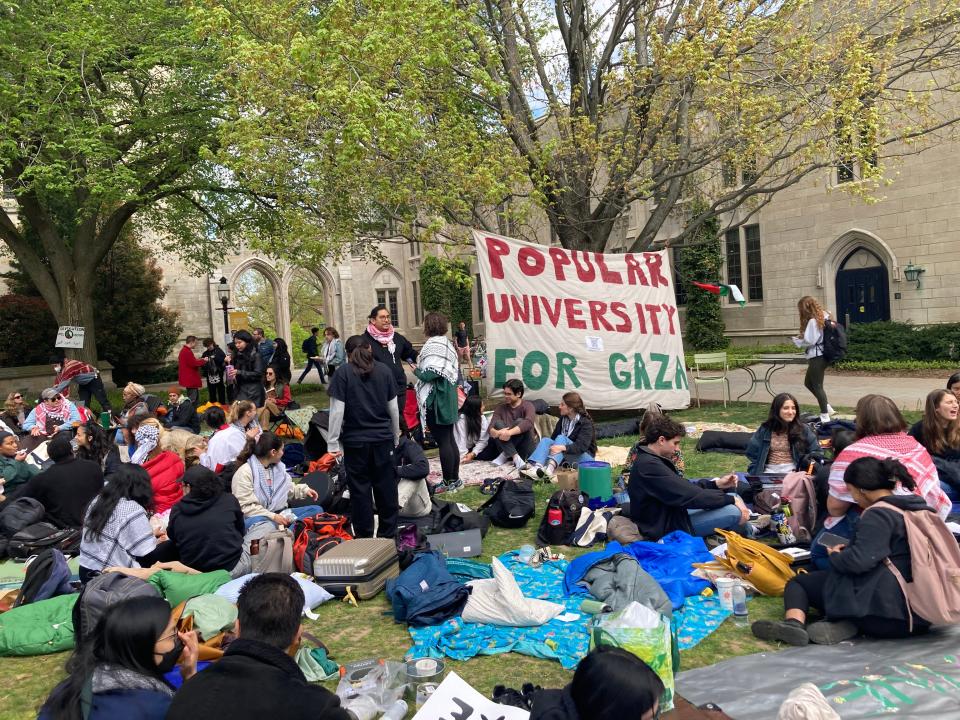13 arrested at Princeton after building takeover to demand Israel divestment
Thirteen people were arrested at Princeton University on Monday night as they took over an administration building to pressure school officials to listen to their demands for divestment from companies linked to Israel’s military campaigns.
The protesters entered administrative offices in Clio Hall at about 4:30 p.m., put up barricades and called for university officials to meet with them. During their takeover and sit-in, hundreds of students rallied outside the building, chanting “Up, up with liberation, down, down with occupation.”
Princeton’s Department of Public Safety and the Princeton Police Department responded and cleared Clio Hall of protesters at about 6 p.m. Protesters then surrounded the bus carrying the arrested students until they were released.
The students received summonses for trespassing, were barred from campus and face disciplinary proceedings, according to the university. They included five undergraduates, six graduate students, one postdoctoral researcher and a person not affiliated with the university.
A university official said Tuesday that protesters surrounded, yelled at and threatened staff, who were "ordered out of the building."
"They now face a University disciplinary process that may lead to suspension, the withholding of degrees, or expulsion," Rochelle Calhoun, vice president for Campus Life, wrote in an email to the campus community on Tuesday.
The Department of Public Safety is investigating others who participated in the sit-in "and more criminal charges may be forthcoming, along with additional University discipline," Calhoun added.

The students who were arrested said in a press conference Tuesday that they engaged in peaceful protest and that no one made threats, adding that they “prayed and sang together while zip tied and handcuffed." They entered the building with Professor Ruha Benjamin, who acted as a legal and faculty observer.
The building takeover marked an escalation in protest tactics five days after Princeton students launched an encampment on a lawn outside the chapel, the latest effort in a growing movement at colleges and universities over Israel's ongoing military campaign in Gaza.
On Monday, they moved tents and signs to Cannon Green, an area located closer to administrative offices. Students said they wanted more visibility because administrators had ignored requests to meet with their bargaining team or listen to their concerns.
Arrests at Princeton of peaceful protesters at Clio Hall right now pic.twitter.com/XcmA40opet
— Narrelle Gilchrist (@NarrelleG) April 29, 2024
“We take the demands of divestment very seriously, and if they are not willing to meet with us, we will find ways to meet with them,” said Aditi Rao, a protest organizer and Princeton doctoral student.
Princeton University President Chris Eisgruber called the incident at Clio Hall a "serious breach of this university’s code of conduct" and "completely unacceptable" in an email to the campus community late Monday.
"Faculty, students, and staff must be able to conduct university business without disruption, harassment, or threat," Eisgruber wrote. "We will continue to work to ensure that this campus is one where all members of the community feel welcome and can thrive."
The sit-in comes after two students were arrested Thursday for their participation in the encampment and charged with trespassing.
In his statement, Eisgruber said that the "vast majority of the people on this campus—students, faculty, and staff—have proven themselves able to engage constructively and civilly on even very divisive topics."
Students pledged to continue their protests. Rao said the encampment had grown to between 300 and 400 people. Over five days, the group has held teach-ins and organized workshops and guest visits from activists and authors.
Its demands include divesting university holdings in companies that profit from or engage in Israel’s ongoing military campaign and occupation, ending weapons research funded by the Department of Defense, and refraining from associations with Israeli academic institutions.
Students said they have held numerous demonstrations and submitted a divestment petition in December, to no avail.
“We have escalated to show that we will stand our ground,” the Princeton Gaza Solidarity Encampment wrote in a statement. “We will continue our sit-in until the university meets us at the bargaining table. Princeton must hear us now.”
Student protests erupted at Columbia University in Manhattan and Yale University in New Haven, Connecticut, overnight.
Protesters blocked entrances to Columbia’s Hamilton Hall and police were limiting access to the area as of Tuesday morning. According to a Tuesday morning statement from Columbia University Public Safety, Morningside campus access has been limited to students who reside in residential buildings on campus and employees who "provide essential services to campus buildings."
Another statement issued Tuesday morning advised members of the campus community to avoid going to the Morningside campus Tuesday if they can "in light of the protest activity on campus."
In New Haven, police blocked an area where students set up an encampment at Cross Campus on College Street. According to a statement from the school Tuesday morning, Yale personnel issued warnings that protesters must end the encampment or face discipline. The protesters chose to leave the encampment, and the university was clearing the tents and other items.
As of Tuesday there were about 15 to 20 protesters left on the sidewalk and no arrests had been made, according to the New Haven Police Department, which said it had no plans to arrest any peaceful protesters.
Rutgers students also set up tents on Monday.
This story was updated to include a statement from Princeton University Tuesday afternoon.
This article originally appeared on NorthJersey.com: Princeton University protesters arrested for Gaza sit-in

